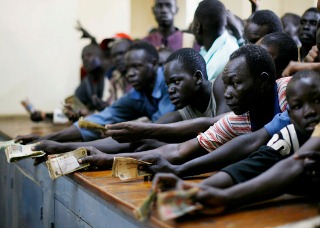S. Sudan grapples with shaky economy, weak local currency
By Julius N. Uma
May 8, 2016 (JUBA) – South Sudan’s new Transitional Government of National Unity faces an uphill task of reviving an economy dependent on oil resources to fund its budget.

Commodity prices also shot up due to the devaluation of the local currency, South Sudanese pound, which has gravely impacted on the transport sector in the country.
The most affected are importers of food items and general household goods who have to deal with sharply increased prices to bring in goods from its neighbouring countries.
South Sudan is one of poorest countries in the world with the worst indicators on development, health and education.
The conflict, which broke out in 2013, has negatively impacted on the nation’s citizens, including pushing the country to the brink of famine with 5.8 million people, nearly half of the population, in desperate need of humanitarian assistance, a joint U.N assessment report recently-showed.
Observers say despite being oil-rich, South Sudan is likely to record negative gross domestic product growth in 2016 after growing by 30.7 percent two years ago, largely due its conflict, decline in oil production and global fall in oil prices.
As the country’s leaders form a unity government, among its first challenges, analysts say, will be to overcome mistrust between them. Besides, there are other rebel groups which did not sign the peace deal and this could prove a setback.
Edmund Yakani, a South Sudanese activist, said the new government should make a resolution on the economic situation in the country, especially in terms of revenue control, financial management and administration decisions and practices.
“The TGoNU should immediately start the process of reconciliation, healing and accountability,” he stressed.
Jok Madut Jok, a researcher with the Sudd Institute, says the unity government needs to quickly internalize six key issues it must start to be tackled, including security matters, economic challenges, humanitarian crisis, selling the peace agreement to the ordinary population, justice and reconciliation and ensuring that the members of the newly formed government work together for the country’s welfare.
“For a country that has depleted its foreign exchange reserves, lost nearly half of its oil revenues due to the war induced discontinuation of oil production and the decline of global prices, it will be even more crucial that the public finance management systems are strengthened, accountability enforced and the sources of revenue diversified,” he said in a position paper published recently.
Fuel costs $4 per litre at the pump, but between $8 and $24 per litre in the black market, but it depends on the demand.
In December 2015, the Central Bank devalued the pound by 84 per cent, which led to immediate hikes prices of basic commodities and pushed the local currency to an all-time low of 42 to the dollar. In recent weeks, however, the pound has been largely unstable as traders continue speculating.
Abraham Awolic, a Juba-based economist, says that it still unclear whether the local South Sudanese pound will stabilise in the near future as the market responds positively to the pending peace or whether it’s relative strengthening is due to speculation by currency traders in black markets.
The Central Bank, he said, must review its policies because the regulation is not proper and would not achieve it aims.
GOVERNMENT OPTIMISTIC
But government officials say the currency devaluation was necessary since South Sudan could not sustain a currency not backed by revenue, production and good reserves.
“Since 2005, we have been depending on oil and stopped agricultural-based production, which had been our source of survival. War came and most of the oil wells were shut down, while the global oil prices drastically declined,” said David Deng Athobei, the South Sudanese finance minister.
In June 2014, oil prices dropped from $112 to $30 per barrel. South Sudan currently produces 160,000 barrels of crude oil per day, down from 350,000 per day before war broke out.
Analysts are optimistic that will the transitional government of national unity in place, donor nations like the U.S., Japan and China will aid the economy. Such assistance, however, will require that South Sudan to initiate economic reforms, fight corruption and improving its human-right records.
Last week, the U.S. government announced more than $86 million in additional humanitarian assistance to help conflict-affected people in South Sudan and refugees in the region.
The new funding, it said, will provide much-needed safe drinking water, emergency health care, nutrition services, shelter, improved sanitation facilities, agricultural training, and seeds, tools, and fishing supplies for the most vulnerable families and communities.
South Sudan’s largest single donor of humanitarian assistance, the US has reportedly donated nearly $1.6 billion since the start of conflict in the country in December 2013.
(ST)
